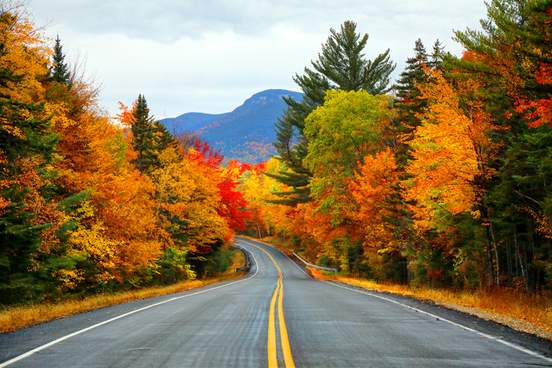
Welcome to New England-ese
Gather round, pull up a stool next to the woodstove, and crack open a can of your favorite gentian-root-flavored carbonated beverage — it’s time to drop your r’s and lift up some classic New England vocab. We’re not saying these words can’t be found outside of the six New England states (and a few of these terms may even be unfamiliar to some lifelong New Englanders), but they are most likely to be uttered, often with considerable pride, up in Ol’ Salty (okay, we made this nickname up).

Frappe
: a milkshake made with ice cream
Order a milkshake in a burg like Braintree or Biddeford, and you might just get milk mixed with flavored syrup. What were you expecting, ice cream? For that, you need to order a frappe (or, if you’re in Bristol, what Rhode Islanders call a “cabinet,” made with that state’s beloved coffee syrup). Frappe comes from the French verb frapper (pronounced /frah-pay/), which means “to hit” or “to strike” in the majority of its uses, but can also mean “to chill, to ice” when used of drinks (like chilling wine, for example). This led to the past participle of the verb, frappé, to be used for an iced drink, sometimes specifically referring to a liqueur served over shaved ice. Ultimately, the word came to be used for a milkshake, and when used with this meaning today, often the accent mark is dropped, giving us frappe (pronounced /frap/).
Remember the ice cream soda fountain in the old general store? Where penny candy was plentiful and the homemade ice cream was rich and piled high? Where you could sit on the stoop on a hot summer’s day or night and lick the melting ice cream as it ran down the cone and onto your hand? … Of course, an ice cream emporium would be incomplete without frappes, floats, malts and shakes.
—The Boston Globe, 7 June 1992
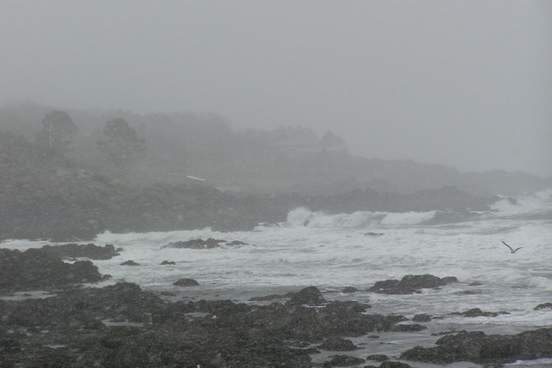
Nor'easter
: a storm with northeast winds
If nor’easter seems a little on the nose as a term for a storm with strong northeasterly winds, chalk it up to that famous Yankee taciturnity. What self-respecting lobsterman has time for such verbal frippery, especially when they’re donning a sou’wester to go face a nor’easter? Nor’easter (or northeaster) can be used for any storm with winds from the northeast, but in New England it most often refers to a strong winter storm, especially one that strikes the coastline.
Enduring the nor’easter, a bluebird enters
a half-town, coda
resolving the Finger Lakes. Evening
gnaws on the damp bone
horizon until nothing’s left…
— Steven Leyva, Prairie Schooner, Fall 2016

Bubbler
: a drinking fountain from which a stream of water bubbles upward
Sometimes it almost seems like the idiosyncratic words used by New Englanders are deliberately anachronistic. Terms like spa for ye olde soda fountain counters, or package store for liquor store, or frappe for milkshake can make it seem like time has stood still in the northeast corner of the country. Among the most localized of these terms is bubbler meaning “drinking fountain.” Except for a part of Wisconsin and the historic downtown drinking fountains in Portland, Oregon, it seems that bubbler is unique to New England use and is by far the least frequent of its synonyms. According to one linguistic survey, water fountain is the most common term in the U.S. as a whole and particularly in the southeastern states, followed by drinking fountain, with bubbler accounting for about 4% of the usage.
They gulp down the cold water at the bubbler before leaving the tennis courts.
— Laura Spence-Ash, New England Review, Vol. 38, No. 2 (2017)

Jimmies
: tiny rod-shaped bits of candy often sprinkled on ice cream or pastries (such as doughnuts)
You may know these colorful sundae (or frappe, or creemee) toppings as sprinkles, an intuitive nom-de-add-on if there ever was one. Jimmies is, shall we say, less intuitive, even if it’s on the tongue (literally and figuratively) of every kid and kid-at-heart at ice cream joints from P-town to Presque Isle. Ask for jimmies on your cone anywhere else, however, and you are bound to get some strange looks.
Once he took me to the zoo. In the monkey house we watched the apes and chimps. I rode on his shoulders, taller than everyone. He held my ankles so I wouldn’t fall and we bounced up and down making jungle noises. Later we ate hot dogs with mustard, and ice cream with rainbow jimmies.
— Natasha Friend, Scholastic Scope, March 2007

Rotary
: a road junction formed around a central circle about which traffic moves in one direction only
Rotaries spin you right round, baby, right round, like a record, baby. While other terms for the traffic-alleviating highway and byway junction (including circle, traffic circle, and, increasingly, roundabout) have started to make their way east of the Berkshires (and mountains north and south), New Englanders still often traverse rotaries on their way to procure frappes and scrod and such.
Cole and Holliwell held to the top of the car interior. They went halfway around the rotary and up a wide, park-sided avenue that ran between the cathedral square and another plaza, visible in the distance, where there were neon signs and taller buildings—office buildings lit on every story.
— Francine du Plessix Gray, World Without End (Simon & Schuster, 1981)
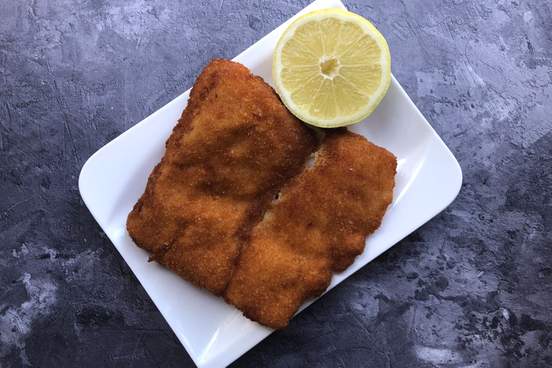
Scrod
: a young fish (such as a cod or haddock)
There once was a man on Cape Cod,
Who asked when he’d finished his scrod
“What species of fish
made this such a fine dish
I’m surprised it has not been outlawed?”
The server replied to this query “Um,”
(for story’s sake let’s call him Merriam),
“scrod just means ‘young fish,’
a haddock, if you wish,
but we’re wicked glad you enjoyed some.”
“I’m different,” he repeated … “but all the others are alike: let ‘em travel in strange places, and they want the food they had at home. When a Bostonian goes to Philadelphia, he wants beans and scrod. When a Nova Scotiaman goes to Boston, he wants smoked herring. When a Philadelphian goes to Albany, he’s always whining for scrapple. And when an American goes to foreign parts, he’s forever wishing for American food. It don’t matter how good the cooking is where he goes: he’d rather have worse things…”
— Kenneth Roberts, Oliver Wiswell (Doubleday, Doran & Company, 1940)
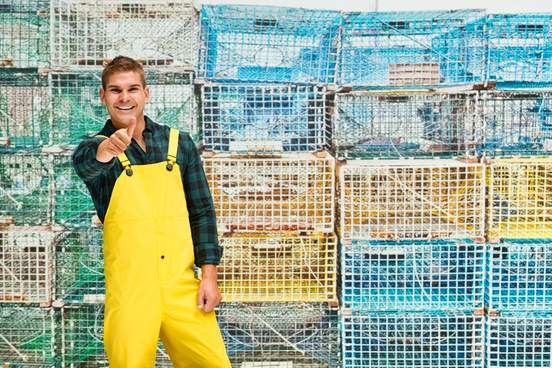
Wicked
: very, extremely
As an adjective, wicked carries the meanings “vile,” “vicious,” and “of exceptional quality or degree” (as in “throws a wicked fastball”). But New Englanders famously use it as an intensifying adverb meaning “to an extreme or impressive degree.”
While this use isn’t exclusive to the Northeast, it has developed a strong association with the culture of New England, and particularly the eastern part of New England. The New Partridge Dictionary of American Slang labels wicked as “[a] rare instance of late C20 American slang that has stayed regional.”
As with other terms associated with New England, wicked feels old. It seems to have echoes of the Salem witch trials, and the pronounced second syllable is an archaism it shares with words like blessed or learned (as opposed to other modifiers, like finished or warmed). But while there are a handful of examples dating back to the Middle Ages (Yesterday was ... a wicked hot day. —Thomas Porter, A Witty Combat, 1663), the explosion of wicked as an adverb is a late 20th-century phenomenon.
I was at the Wellfleet Marketplace, where the prices were high and the food was great. I’d just come from Tasha’s delivery of a healthy baby boy, which despite Carline’s dire warnings, had gone beautifully. But I was wicked tired, since the baby had had been born at 4:00 a.m. and I’d left the hospital at nine. I had no food in the house and didn’t feel like fighting the throngs at Stop & Shop in Orleans. … I figured I’d hit the deli for a massive grinder, grab some chocolate and wine and head home.
— Kristan Higgins, Out of the Clear Blue Sky (Berkeley, 2022)
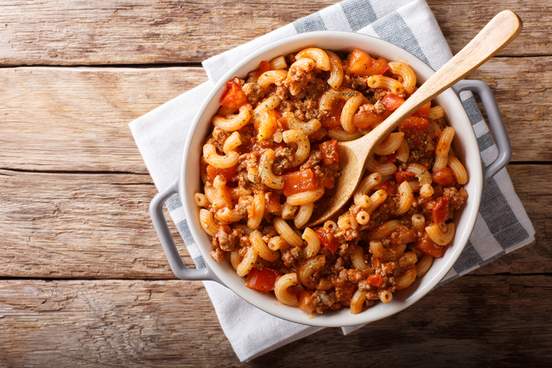
American Chop Suey
: a dish of elbow macaroni, ground beef, and tomatoes or tomato sauce typically with chopped onions and green peppers
Chop suey, as most Americans understand it, refers to a dish that usually consists of bean sprouts, bamboo shoots, water chestnuts, onions, mushrooms, and meat or fish, that is served with rice and soy sauce. Chop suey comes from two words belonging to a dialect of Chinese spoken in Guangzhou and Hong Kong, transliterated in English as jaahp (“miscellaneous”) and seui (“bits”), or jaahp-seui (“odds and ends”). The bits that make up American chop suey are pretty standard in Italian-American cuisine (though New Englanders prefer to call ground beef hamburg, thank you wicked much, and also tend to add Worcestershire sauce), but the key is that everything is mixed together—a similar dish is called goulash in parts yonder—before being ladled onto the plate or cafeteria tray.
I don’t want to bore you with the next seven years. What was there? Driving down to Old Sully’s on ten-cent wing night to smoke the townies in darts and hit on the community college girls. Eating American chop suey in front of the TV with Dad and listening for the scrape of snow plows.
— Spencer Wise, The Literary Review, (Vol. 62 Issue 01, 2019)

Gool/Gools
: an area that is to be reached for safety or as the objective in children’s games
Olly olly oxen free—it’s safe to come out now and hear tell of gool (sometimes gools as in, “you can’t tag me, I’m on gools”). Actually, the tale is not very long—gool is simply a dialectical alteration of goal—but gool is interesting as a word that, like bubbler, is rarely heard outside of New England (even within New England it’s quite uncommon and hyperlocal, at least nowadays).
“Gool was a place, for example a tree, clothesline pole, gutter, dirt patch, etc., where one would be safe, couldn’t be tagged, when he/she and a bunch of kids were playing a game of tag. Often, upon reaching the designated place, the person would yell “Gool!” He/she couldn’t be tagged while touching gool.”
— Anon., Dictionary of American Regional English, 1988 (accessed 21 July 2023)
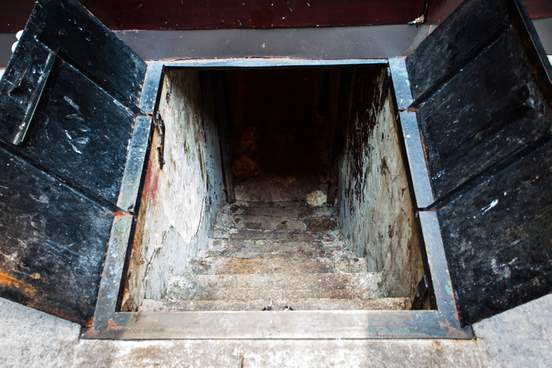
Down Cellar/Up Attic
: in or into the cellar/in or into the attic
The construction down cellar (and its less common counterpart up attic) isn’t terribly difficult to grok — New Englanders simply omit an “in the” (“the case of Moxie is down cellar”) or “into the” (“please go down cellar and grab a couple cans of chowder”) where, say, a Cornhusker or Buckeye would not.
Poor Merry put away the delicate task she was just beginning to like, and taking a pan went down cellar, wishing vegetables could be grown without earth, for she hated to put her hands in dirty water.
— Louisa May Alcott, Jack and Jill: A Village Story (Roberts Brothers, 1880)“It’s her father’s fault. He was sensitive, he talked about poetry. Wrote some, too, had it printed in the paper, and then he spent a small fortune getting it made into a book. Five hundred copies. Four hundred and ninety of ‘em, they’re still up attic.”
— Dan Wickenden, Harper’s Magazine, April 1952

Clicker
: a remote control for a television
We don’t control what people call their remote controls but neither are we remote about the subject (as lexicographers we often can’t control ourselves when folks in remote places have their own nifty words for things). Clicker can refer to any device that is operated with a button that makes a click sound when pressed, such as a mechanical handheld counter used for tallying things, as well as any remote control. In New England, clicker (or, ahem, “clickah”) is used especially for television remote controls, harking back to the days when they made audible, sounds themselves rather than prompting digital bleeps and bloops from the speakers.
I get a runny head and start feeling wobbly, and my mom takes my temperature and then kicks my daddy off the couch during Jeopardy so I can lie down. My daddy gives me the clicker and sits in the armchair, and my mom puts the tissue box and a blanket, even though it’s about a million degrees outside, on the coffee table.
— E. R. Frank, Life Is Funny (Puffin Books, 2002)

Creemee
: a Vermont specialty of thick soft-serve ice cream often flavored with maple syrup
We don’t currently cover creemee in our dictionaries, but both the word and the treat it refers to are deeply beloved in Vermont. Boasting higher butterfat content than regular soft-serve ice cream, creemees are rich and thick. Chocolate creemees, vanilla creemees, and twists of both are popular, but Vermonters will tell you that maple creemees are where it’s at.
Vermont v. Larocque had not been her first trial. When Joanna was selected for jury duty last fall, she was assigned three times, the maximum for a single summons. … She thought they could do worse than to choose her. She’d never played football with the defendant or worked at the creemee stand with his daughter. Her own daughter was not in drama club with the attorney’s son and she was not formerly married to any of the witnesses on the list.
— Carolyn Kuebler, The Literary Review, Summer 2017





